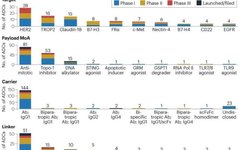Next Generation Antibody-Drug Conjugates (ADCs): What They Look Like
Antibody-drug conjugates (ADCs) have become an important treatment method in the field of oncology, offering superior clinical characteristics compared to chemotherapy. However, the application of ADCs still faces two significant challenges. First, there are very few validated payloads with proven mechanisms of action (MoA), which limits the expansion of indications. Approved ADC payloads cover three … Read more
